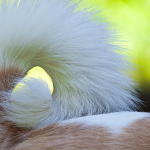Precocious children start changing around the age of eight or nine. You’ll see first tufts of fur emerge as their limbs begin to lengthen, as bodies stretch and grow. Stroke their sleeping heads and kiss them goodnight, inhale the sweet scent of childhood while it lasts.
For most, the changes really begin to take hold from ten or eleven, right about the time you apply for their place in secondary school and contemplate getting them that mobile phone they’ve been nagging you for. Accept that just as society dictates they must go out into the world to fend for themselves, so too their bodies demand the same; a chance to push away from the warmth of their siblings and the homes they have known, to explore beyond the bounds of their back gardens. Offer your support, but do not attempt to interfere. The metamorphosis has begun.
Fur sprouts in earnest from twelve or thirteen. Faces take on new dimensions, ears extend and teeth lengthen, legs grow long and lithe. Whiskers may become long and unruly, hair untended, sometimes even matted. Your once calm child will become skittish and jumpy, prone to outbursts they seem unable to control. Continue to maintain a calm and reasonable outlook at all times.
Next comes the burrowing. Other parents have warned you about this; how they will shun your company and keep irregular hours, eating whatever they can forage with dirt-encrusted fingers. Dragging them out of their hole by the ears is not recommended – bites can be vicious.
When release day comes, it will seem like any other to begin with – you won’t be prepared. The clouds may hang low in the treetops, or perhaps the sun will be shining through the new beech leaves, still crinkled and soft on the branches. Your young rabbit will emerge blinking from their burrow, whiskers twitching, limbs restless. Don’t try to resist the inevitable; you must make the journey to the forest together. When you set your young rabbit loose, they will bound away from you, white tail flashing, running for cover. They won’t turn back to look at you.
There will be days when your heart pulls you back to the edge of that forest, hoping to catch sight of your rabbit. Other parents may loiter there too, leaving favoured titbits, eyeing each other anxiously. You may hear a rustle in the undergrowth, or see a flash of something furry dart past. You must trust that you have done enough and turn for home.
If you are lucky, your rabbit will survive and grow. They will outrun the things that would pursue and devour them, learn the ways of the wicked and the good. If you are luckier still, your child will shed their rabbit fur and whiskers and emerge from the forest unscathed. They will grow into a new skin, and come back to find you again.
…
Biography
Rebecca Field lives and writes in Derbyshire, UK. She has work in several print anthologies and has also been published online by Reflex Press, The Daily Drunk, The Phare, Ghost Parachute, The Cabinet of Heed and Ellipsis Zine among others. Tweets at @RebeccaFwrites
Image: unsplash.com





